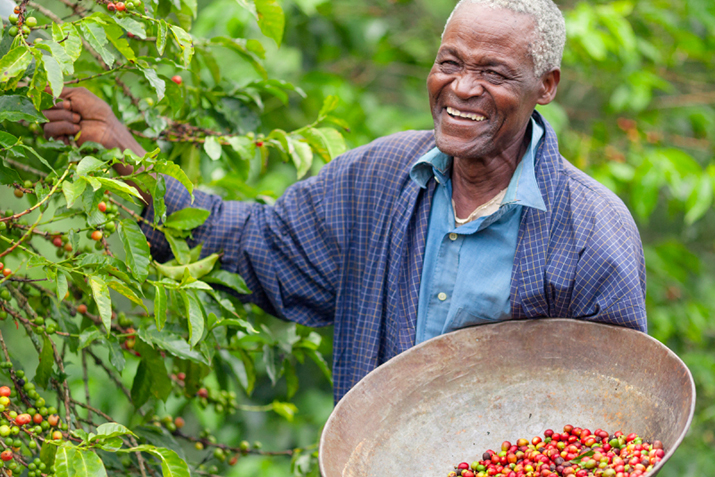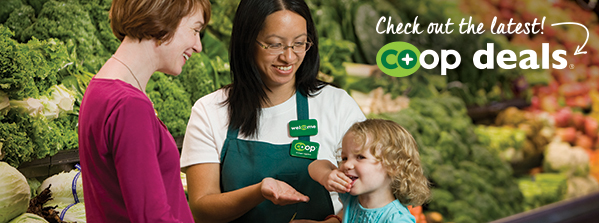Article
2023 Food Co-op Impact Report

Food Co-ops: Where Community Is Served
It’s an exciting time to be part of a food co-op in the United States — growing numbers of people and communities are discovering their power and organizing food co-ops in their neighborhoods, while thriving food co-ops continue to grow and adapt to serve their communities.
The food co-ops around the country that own National Co+op Grocers (NCG) work together collectively to strengthen our ability to positively impact the national food system and grow the cooperative economy in an inclusive and environmentally regenerative manner.
In pursuit of these goals, we collectively report our social and environmental impact data to measure the benefits that the “average” food co-op brings to its community. But make no mistake — there’s nothing average about us. Every co-op is as vibrantly unique as the community it serves, and that’s the secret ingredient. People form food co-ops when their community comes together around the need for reliable access to the kinds of food that people living there want to eat. It’s a powerful way to build food security, community resilience and economic empowerment.
If that sounds good to you, consider joining a food co-op near you! If you’re already a co-op shopper or member, thank you for strengthening your community and local
food system.
Co-ops Are Businesses with Principles
People have been forming cooperatives to advance social and environmental change in the United States and abroad for more than a century; cooperation is something humans instinctively understand and practice.
Cooperatives are based on international principles intended to prevent the extreme wealth imbalances perpetuated by traditional business models. Food, banking, healthcare, housing, electricity — essential community needs are well met through cooperation all over the world. Look around for co-ops, collectives and credit unions near you to find people working together for the common good.
The 161 food co-ops that own NCG are consumer co-ops (owned by member shoppers) with stores in 220+ communities and growing. While you don’t have to be a member to shop at most food co-ops, members receive extra benefits. For example, many co-ops distribute net surplus to members as patronage dividends in profitable years.
Career Opportunities in Local Communities
Your local food co-op has numerous career opportunities, from entry-level jobs to management and positions in between. Working with and for your community at the co-op feels rewarding, and helping provide good food to your neighbors is meaningful work.
Large food co-ops employ hundreds of staff, while smaller co-ops often have a smaller crew. The average food co-op employs 117 staff. Big or small, co-ops teach transferable skills on the job, encourage people to grow into their strengths and offer career experiences that can be leveraged beyond the grocery industry.
Co-ops’ principle of concern for community drives us to help advance the financial security of workers. NCG encourages food co-ops in meeting this goal by facilitating programs that help to lower co-ops’ operating expenses. On average, 57% of staff at food co-ops are eligible for healthcare benefits and 44% of food co-ops report that they pay both full-time and part-time staff a livable wage.
Making Food More Affordable
Food co-ops first organized NCG as a national cooperative of cooperatives so we could deliver on our promise to sell the kind of food our communities want at the lowest prices possible.
We’ve organized national promotions programs to leverage our purchasing power and make food more affordable. Our Co+op Deals and Co+op Basics programs help co-ops compete with national chains on name brand and private label groceries, and many co-ops are connecting with new local and regional producers to offer more affordable prices on fresh staples such as eggs, milk and bread. The ability of food co-ops to pivot and respond to community needs is part of what makes us resilient.
Racism and poverty are root causes of hunger. Food co-ops donate over a million pounds of food to local food pantries each year. Through NCG, co-ops work together to fund organizations working to dismantle systemic racism in the national food system, as well as lobbying efforts to preserve and increase funding for food programs such as SNAP*, WIC* and other programs that double SNAP shoppers’ money for local produce.
*Supplemental Nutrition Assistance Program (SNAP) and Special Supplemental Nutrition Program for Women, Infants and Children (WIC)
Local Makers, Real Stories, Big Dreams
Communities thrive when the people who live there have opportunities. Food co-ops have had good relationships with local farmers and makers for decades. Local food increases our connection to each other and the land on which we all live.
Creating opportunities for mutual benefit is what cooperation is all about. Food co-ops have helped launch thousands of local small business owners, providing a market for their product and telling their story, demonstrating that it’s possible to build a resilient and equitable local supply chain from the ground up.
Through NCG, we advocate for federal policies to help small, regional farmers and producers thrive, including in the Farm Bill. In 2023, we coordinated a consumer call-to-action campaign to ask Congress to include 35 pieces of legislation promoting food co-op priorities in areas including local food and farming, racial equity and food justice, hunger and nutrition, climate action and organic agriculture.
Food co-ops donate to National Farm to School Network, an organization bringing the benefits of locally grown food into public schools in all 50 states and U.S. territories, and expanding the market for local farmers and producers,
as well.
Community Makes Us Strong
The cooperative business model was born out of the earliest labor movements of the industrial revolution and has been used by Civil Rights activists to create economic opportunity for the powerless in nearly every industry you can name.
Today, many Black communities are organizing food co-ops to resist and defend their communities from food apartheid, the result of the systemic racism that permeates our national food system. NCG food co-ops stand in solidarity by contributing financially to organizing efforts through the National Black Food and Justice Alliance, as well as working to make our network more accessible, inclusive and equitable.
NCG offers education and facilitates dialogue with member co-ops on the path towards being diverse, inclusive organizations with equitable opportunities. Currently 66% of NCG food co-ops report that they are consensually measuring staff demographics. We hope the diversity of co-op staff and leadership moves closer to that of their community over time.
Investments in Racial Justice in the Food System
NCG donates to Alianza Nacional de Campesinas, Agricultural Justice Project, Federation of Southern Cooperatives/Land Assistance Fund, and National Black Food and Justice Alliance.
A Safer, Just and Inclusive Supply Chain
Co-ops are committed to promoting products that share our vision of a food system that upholds the dignity of workers of all kinds and prioritizes their wellbeing.
Inclusive Trade
Food co-ops’ Inclusive Trade program promotes products from companies certified to be at least 51% owned, operated and controlled by people who identify as women, People of the Global Majority, LGBTQIA+, persons with disabilities and veterans. In 2023, we added and promoted 35 more Inclusive Trade partners in Co+op Deals. In total, 47 Inclusive Trade brands were featured in Co+op Deals, generating $8.4 million in promotional sales.
B Corp
As a Certified B Corporation, NCG is a leader in the global movement for an inclusive, equitable and regenerative economy. All B Corporations complete a rigorous social and environmental assessment. In 2023, we achieved recertification as a B Corp with an improved score of 93.9.
Cooperatively Produced
Cooperatives are known for their democratic governance and can be worker, producer, or consumer led. All cooperatives follow international principles that guide holistic decision making.
Fair Trade Certified
Fair trade certification verifies that producers are paid a livable wage with safe working conditions and prohibits child labor.
An Abundant, Regenerative and Biodiverse Planet
The same kinds of outdated policies and values that uphold systemic racism have also contributed to our rapidly changing climate, extinction of wildlife and the destruction of our environment. Food co-ops have supported practices that mitigate these impacts — such as energy conservation and sourcing food grown with regenerative farming methods that are good for farmworker health and give back more than they take from nature — since the 1970s.
When done intentionally, organic agriculture is a regenerative farming system that builds soil health and increases its ability to capture and hold carbon (as CO2) from the atmosphere. Organic farming is good for bees and butterflies and builds biodiversity by working with the natural food chain to control pests, the way nature balances itself.
Food co-ops participate in consumer advocacy for strong national organic standards at the federal level through NCG. In partnership with organic advocacy groups National Organic Coalition (NOC) and Organic Trade Association (OTA), NCG celebrated USDA’s finalization of two important rules that strengthen organic animal welfare standards and organic integrity. Food co-ops and our allies advocated for these improvements for years.
Climate crisis and environmental responsibility
NCG signed on as partner for USDA’s Climate Smart Commodities grant program for two projects, working with Rural Advancement Foundation International (RAFI-USA) and A Greener World to incentivize and train farmers to adopt regenerative practices on their farms, and partnering with National Cooperative Business Association to promote and market climate smart commodities produced in Puerto Rico.
Food co-ops sponsored a national conference on plastic reduction in the organic supply chain. NCG was the sole sponsor of The Organic Center’s 2023 Confluences conference — bringing together scientists, federal policymakers and farmers to discuss how we can reduce plastic use in the organic supply chain.
About this content
This content is based on food co-op impact metrics and other data collected by National Co+op Grocers (NCG) — a business services cooperative owned by retail food co-ops located throughout the United States. NCG represents 161 retail food co-ops operating over 230 stores in 39 states. As part of an ongoing commitment to demonstrate the value of the cooperative business model to local communities, NCG began measuring the social, environmental and economic impacts of food co-ops in 2012.




















